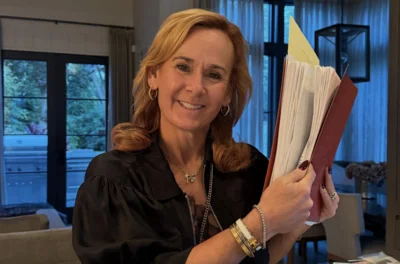Sen. John Curran | Facebook
Sen. John Curran | Facebook
State Sen. John Curran (R-Downers Grove) recently reposted a video from when the legislature was first considering the SAFE-T Act, in which he highlighted some constraints the bill will place on police departments and explains how he thinks communities will be less safe, especially when cash bail is eliminated on Jan. 1, 2023.
"A quick flashback to Lame Duck Session in January of 2021 when I first sounded the alarm about the 'SAFE-T Act,' which would then, just hours later, be passed in the middle of the night," Curran posted. "Now, fast forward nearly two years, and some of those most dangerous provisions are set to take effect on January 1, 2023."
"If someone is deemed by a judge to be a threat to community safety, they are still released. No bail, just released pre-trial," Curran said in the video. "That is going to lead to a big decrease in any sort of detention. In addition, it's going to disrupt any sort of policing and solving crimes. It's going to prevent police from actually talking to offenders and gaining information."
Curran said in the video that this would disrupt law enforcement.
"This bill attacks our police. Make no mistakes about it: policing will radically change throughout the state of Illinois, and it will be more difficult for every municipality and county to deploy a police department," Curran said. "This has gross, unfunded mandates on our police departments, on our municipalities, which ultimately are going to lead to property tax increases back home, or a reduction in policing services and staff. One way or the other, this is going to hamper community safety. Police deserve our support."
Radio station 97 ZOK ran a list circulating on the internet of offenses that allegedly will be considered "non-detainable": arson, burglary, aggravated battery, aggravated DUI, aggravated fleeing, drug-induced homicide, intimidation, kidnapping, robbery, threatening a public official, and 2nd degree murder.
However, WFCN News reported that the Office of the Governor released graphics on Monday claiming that "there is no such thing as a non-detainable offense," and that defendents would be held "based on risk not riches."
Gov. Pritzker defended the elimination of cash bail, according to The Center Square. "We do not want someone in jail because they were arrested for a low-level crime like shoplifting to be sitting in jail for months or maybe even years," Pritzker said. "At the same time, someone who is a wealthy drug dealer, perhaps accused of murder and arrested, can show up with a suitcase full of money and get out of jail."
Supporters of the Safety, Accountability, Fairness and Equity-Today (SAFE-T) Act, including the Illinois Legislative Black Caucus, point to the legislation as a step toward making the justice system more equitable for minorities.
Republicans have called the SAFE-T Act a "de facto defund the police bill" because of the additional regulations it places on police officers.
One provision of the SAFE-T Act that took effect in January of this year allows criminal defendants who are awaiting trial on home confinement to move freely, without electronic monitoring, two days a week, according to the Chicago Sun-Times. The defendants are supposed to use that time to look for employment, attend school, undergo treatment for a drug addiction or mental illness, or grocery shop. However, in the first three months of 2022, around two dozen people were arrested in Cook County during their "essential movement" days. Democratic Cook County Sheriff Tom Dart has called for an end to the "essential movement" provision, stating, "At a bare minimum, they should say, 'If you're charged with a violent offense, and you're given home monitoring, you don't get to wander around free for two days a week.'"
SafeWise's annual 2022 State of Safety survey found that only 42% of Illinois residents report feeling safe, while 64% reported feeling "high daily concern" for their safety. 13% of respondents reported experiencing gun violence firsthand, an increase from 8% the previous year. Mass shooting incidents in Illinois increased by 25% from 2020 to 2021.






 Alerts Sign-up
Alerts Sign-up